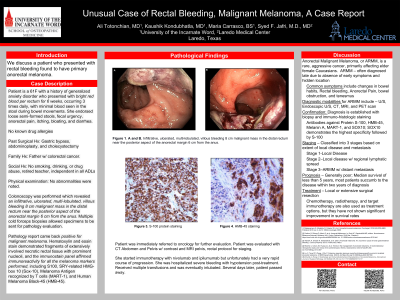Sunday Poster Session
Category: Colon
P0322 - Unusual Case of Rectal Bleeding, Malignant Melanoma, a Case Report
Sunday, October 22, 2023
3:30 PM - 7:00 PM PT
Location: Exhibit Hall

Has Audio
- AT
Ali Totonchian, MD
Laredo Medical Center
Laredo, TX
Presenting Author(s)
Ali Totonchian, MD1, Kaushik Kondubhatla, MD1, Maria F. Carrasaco, BS2, Syed F. Jafri, MD3
1Laredo Medical Center, Laredo, TX; 2University of the Incarnate Word, San Antonio, TX; 3GIA / TDDC, Webster, TX
Introduction: We discuss a 61 year old female who presented with rectal bleeding found to have primary anorectal melanoma.
Case Description/Methods: The patient is a 61 year old female with a history of generalized anxiety disorder who presented with bright red blood per rectum for 6 weeks. She reported bleeding three times a day, with minimal blood seen in the stool during bowel movements. She also reported loose semi-formed stools, fecal urgency, anorectal pain, itching, bloating, and diarrhea. The patient had a past surgical history of gastric bypass, tummy tuck, and cholecystectomy, and family history of colorectal cancer. On physical examination, no abnormalities were noted. After consultation with gastroenterology (GI), the patient underwent colonoscopy revealing an 8 cm malignant mass in the rectum. Pathology confirmed the presence of malignant melanoma, reporting extensive involvement of the rectal tissue with necrosis and positive immuno-stains for melanoma markers.
Discussion: Anorectal Malignant Melanoma (ARMM) is a rare and aggressive cancer that primarily affects older individuals, particularly females and Caucasians. The exact cause is not well understood, but oxidative stress and immunocompromised states are believed to contribute to the malignant transformation of melanocytes. Increased estrogen levels may also play a role in the higher incidence among women.
ARMM is often diagnosed late due to the absence of early symptoms and its hidden location. Common signs and symptoms include changes in bowel habits, rectal bleeding, anorectal pain, bowel obstruction, and rectal tenesmus. The lack of superficial symptoms and absence of a gold standard diagnostic modality contributes to the delayed diagnosis.
Diagnostic modalities used for ARMM include, include ultrasound, endoscopic ultrasound, computed tomography, magnetic resonance imaging, and positive emission tomography. Staging of ARMM is classified into three stages based on the extent of local disease and metastasis. The prognosis for ARMM is generally poor, with a median survival of less than five years, and most patients succumb to the disease within the first two years of diagnosis
The treatment of choice for ARMM is local or extensive surgical resection. Surgery has shown to improve survival in localized ARMM. however, the prognosis remains comparable in regional and distant cases. Chemotherapy, radiotherapy and target immunotherapy are also used as treatment options, but they have not shown significant improvement in survival rates.

Disclosures:
Ali Totonchian, MD1, Kaushik Kondubhatla, MD1, Maria F. Carrasaco, BS2, Syed F. Jafri, MD3. P0322 - Unusual Case of Rectal Bleeding, Malignant Melanoma, a Case Report, ACG 2023 Annual Scientific Meeting Abstracts. Vancouver, BC, Canada: American College of Gastroenterology.
1Laredo Medical Center, Laredo, TX; 2University of the Incarnate Word, San Antonio, TX; 3GIA / TDDC, Webster, TX
Introduction: We discuss a 61 year old female who presented with rectal bleeding found to have primary anorectal melanoma.
Case Description/Methods: The patient is a 61 year old female with a history of generalized anxiety disorder who presented with bright red blood per rectum for 6 weeks. She reported bleeding three times a day, with minimal blood seen in the stool during bowel movements. She also reported loose semi-formed stools, fecal urgency, anorectal pain, itching, bloating, and diarrhea. The patient had a past surgical history of gastric bypass, tummy tuck, and cholecystectomy, and family history of colorectal cancer. On physical examination, no abnormalities were noted. After consultation with gastroenterology (GI), the patient underwent colonoscopy revealing an 8 cm malignant mass in the rectum. Pathology confirmed the presence of malignant melanoma, reporting extensive involvement of the rectal tissue with necrosis and positive immuno-stains for melanoma markers.
Discussion: Anorectal Malignant Melanoma (ARMM) is a rare and aggressive cancer that primarily affects older individuals, particularly females and Caucasians. The exact cause is not well understood, but oxidative stress and immunocompromised states are believed to contribute to the malignant transformation of melanocytes. Increased estrogen levels may also play a role in the higher incidence among women.
ARMM is often diagnosed late due to the absence of early symptoms and its hidden location. Common signs and symptoms include changes in bowel habits, rectal bleeding, anorectal pain, bowel obstruction, and rectal tenesmus. The lack of superficial symptoms and absence of a gold standard diagnostic modality contributes to the delayed diagnosis.
Diagnostic modalities used for ARMM include, include ultrasound, endoscopic ultrasound, computed tomography, magnetic resonance imaging, and positive emission tomography. Staging of ARMM is classified into three stages based on the extent of local disease and metastasis. The prognosis for ARMM is generally poor, with a median survival of less than five years, and most patients succumb to the disease within the first two years of diagnosis
The treatment of choice for ARMM is local or extensive surgical resection. Surgery has shown to improve survival in localized ARMM. however, the prognosis remains comparable in regional and distant cases. Chemotherapy, radiotherapy and target immunotherapy are also used as treatment options, but they have not shown significant improvement in survival rates.

Figure: View of Anorectal Mass. confirmed malignant melanoma
Disclosures:
Ali Totonchian indicated no relevant financial relationships.
Kaushik Kondubhatla indicated no relevant financial relationships.
Maria Carrasaco indicated no relevant financial relationships.
Syed Jafri indicated no relevant financial relationships.
Ali Totonchian, MD1, Kaushik Kondubhatla, MD1, Maria F. Carrasaco, BS2, Syed F. Jafri, MD3. P0322 - Unusual Case of Rectal Bleeding, Malignant Melanoma, a Case Report, ACG 2023 Annual Scientific Meeting Abstracts. Vancouver, BC, Canada: American College of Gastroenterology.
